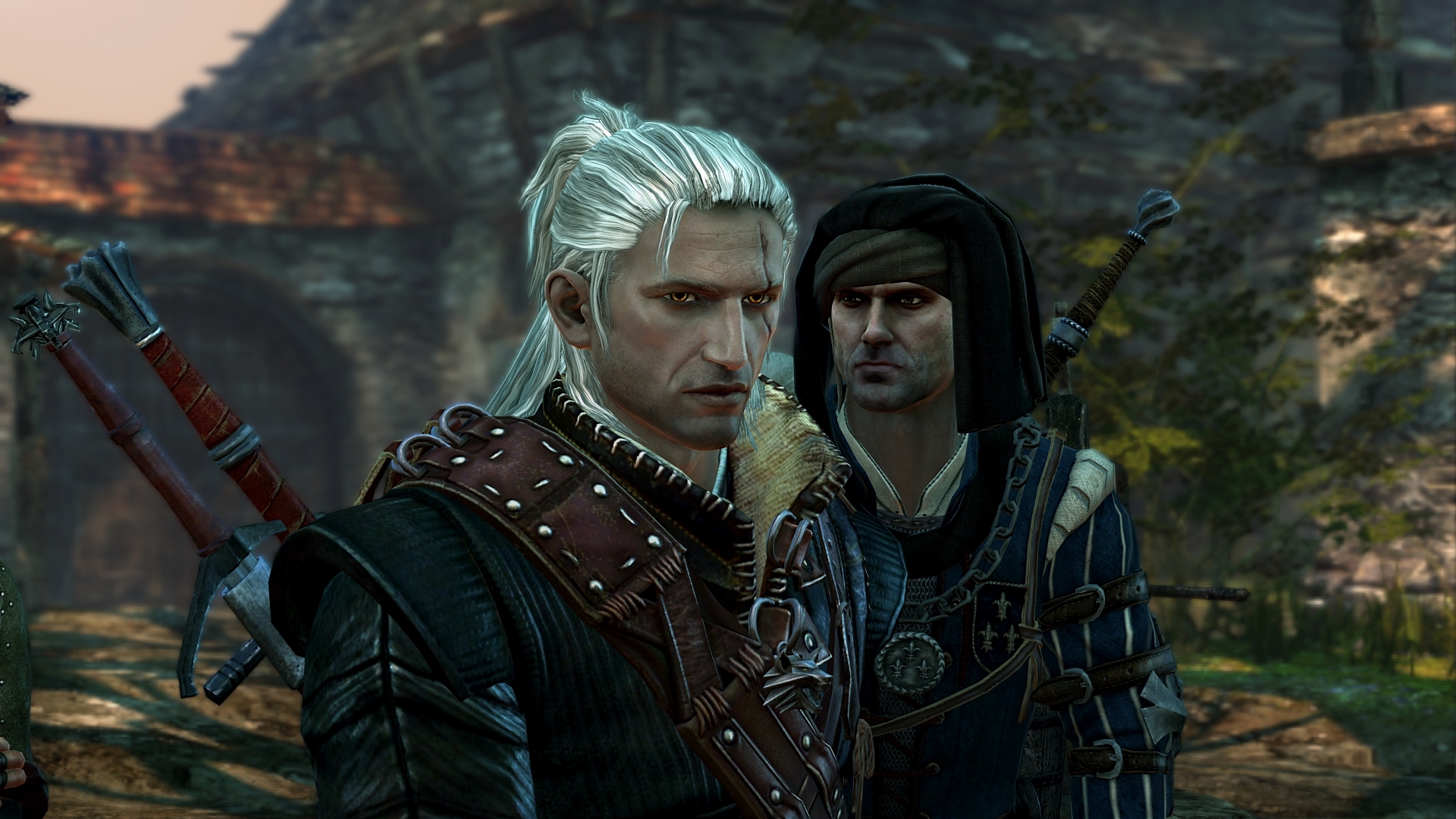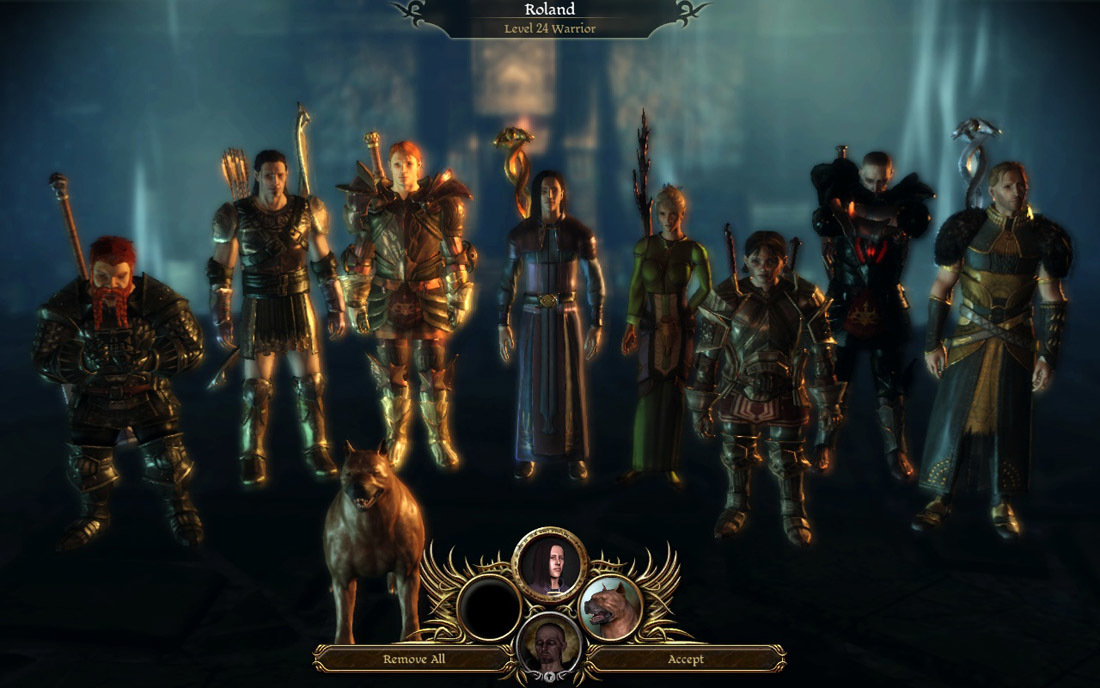The problem of dissonance between the narrative and the gameplay
Many gamers must have found themselves in a situation where they had to sacrifice role-playing for the sake of gameplay. For example, commit a betrayal of a good hero or skip a visit to a picturesque location to learn a new skill or discover a new game character. The reason for this is the discord between the narrative and the gameplay.

Immersion in the game world collapses, because you are faced with reality, which is as follows:
One of the most important elements of any RPG is immersive. In the absence of a believable, consistent and intriguing plot, the impression of the game can be hopelessly flawed. If the developers focus on a strong story, the player knowingly enters into some kind of tacit agreement with the narrative designer. The player agrees to make an emotional contribution to reincarnation in his character, and the narrative designer - to create the necessary conditions for this. Ideally, a player should not lose touch with his alter ego, unless an external factor breaks it.
')
In this regard, it is necessary to answer the key question: should the narrative be intertwined with the gameplay so that decisions taken in one plane limit choice in the other? If not, you need to push a number of design restrictions.
Decisions related to the narrative should not affect:
Decisions related to gameplay should not affect:
These principles are used in the games Witcher 2: Assassins of Kings and Shadowrun: Dragonfall. In Witcher 2 there are two storylines with different tasks and locations, but, whatever you choose, you will find:
When creating a character in Shadowrun, along with a set of skills, you can choose etiquette (street, gangster, academic, etc.) that opens up new answers in dialogs. That is, a shaman who invokes spirits in battle can also understand the laws of high society or the laws of streets. Narrative choice is reduced to one decision at the beginning of the game and does not intersect with the choice of skills and abilities.

In fairness, it is worth highlighting some exceptions, when the choice of a particular role can justifiably influence the gameplay. For example, the complexity of Dark Souls directly depends on the combat mechanics used. Playing a wizard is much simpler: ranged skills allow you to avoid a direct collision with an enemy and, therefore, reduce the risk of death. Nevertheless, even in the role of a wizard, the passage of the game is rather hardcore. No wonder the slogan Dark Souls - "Get ready to die."
Another illustrative example is the choice at the beginning of the game, on which it depends which items, skills and even fragments of the game world will be available later. Thus, the passage and the lion's share of Star Wars: The Old Republic content differs depending on the character class chosen. In fact, passing different classes - these are separate games with similar mechanics, independent of each other. After playing the Jedi, you can start the smuggler again and get a completely different gaming experience. However, there are pitfalls. First, if a player consciously limits himself to choosing a particular role, and later it turns out that all classes have access to the same content, he will be disappointed. Secondly, if different storylines sooner or later merge into one, players will consider classes from a practical point of view, and then the choice of the initial path will depend on the skills and abilities of a particular character.
In order to avoid the above problems, follow the following guidelines to help you distinguish between a narrative and a gameplay.
1. Several game characters or allies
Instead of developing skills for each character, tie them to an independent element available to several characters. The bottom line is that when choosing skills and abilities or recruiting characters into a group, the player gets the desired gameplay without sacrificing his wins.

Example:
Combat skills can be tied to weapons that you can equip on your own. In principle, all character skills can be based on his equipment. Thus, any hero can perform any combat role. Regardless of which build you choose for your character, the plot decisions will remain completely under your control.
2. Branch of the plot
When creating multiple storylines, try to take into account the following points:
Example:
The mayor promised a reward for helping the townspeople - the farmer and trader. The farmer asks to protect his plot from the gangsters, the trader - to find the shop robber. You can choose who to help first, and this choice will have consequences. Regardless of the decision, you will receive the same reward and amount of experience. But your choice will affect further developments, whether changes in the plot or in the structure of subsequent levels.
3. Narrative Management with Skills
By investing points in a particular characteristic or skill, you can open new answers in dialogs. The problem is that if a player wants to get access to a specific online thread, he will have to invest a lot of points in the development of the corresponding skill. Therefore, it is important to separate “conversational” skills from ordinary ones. Thus, the player will not have to sacrifice his favorite gameplay for the sake of exploring a separate narrative branch.
Example:
Suppose the character's characteristics allow you to lie, intimidate, or manipulate the mind of an NPC. The hypothetical player wants to try on the role of a warrior, controlling the mind of opponents. But in order to fight well in melee, his character will need a high Strength - a characteristic that in many games is responsible for intimidation, not mind control. Move away from the genre canons and give the player the opportunity to combine martial and "social" skills. Even if lies, intimidation and mind control ultimately lead to the same results, the choice and role-playing can be important for the player.
If you, like me, don’t like it when the narrative and the gameplay corner each other, I hope the suggested ideas will help to avoid it. If you have any advice or objection, be sure to share it in the comments!

Immersion in the game world collapses, because you are faced with reality, which is as follows:
- there are obstacles in the game;
- your character must overcome them;
- as a player, it may be more profitable for you to sacrifice narrative baggage for the sake of leveling your character.
Decision
One of the most important elements of any RPG is immersive. In the absence of a believable, consistent and intriguing plot, the impression of the game can be hopelessly flawed. If the developers focus on a strong story, the player knowingly enters into some kind of tacit agreement with the narrative designer. The player agrees to make an emotional contribution to reincarnation in his character, and the narrative designer - to create the necessary conditions for this. Ideally, a player should not lose touch with his alter ego, unless an external factor breaks it.
')
In this regard, it is necessary to answer the key question: should the narrative be intertwined with the gameplay so that decisions taken in one plane limit choice in the other? If not, you need to push a number of design restrictions.
Decisions related to the narrative should not affect:
- available gameplay mechanics,
- level of difficulty,
- access to special equipment and skills.
Decisions related to gameplay should not affect:
- access to game characters, locations, equipment and skills,
- plot development
These principles are used in the games Witcher 2: Assassins of Kings and Shadowrun: Dragonfall. In Witcher 2 there are two storylines with different tasks and locations, but, whatever you choose, you will find:
- the same number of battles and trophies
- the same level of difficulty
- the same quality equipment.
When creating a character in Shadowrun, along with a set of skills, you can choose etiquette (street, gangster, academic, etc.) that opens up new answers in dialogs. That is, a shaman who invokes spirits in battle can also understand the laws of high society or the laws of streets. Narrative choice is reduced to one decision at the beginning of the game and does not intersect with the choice of skills and abilities.

Exceptions
In fairness, it is worth highlighting some exceptions, when the choice of a particular role can justifiably influence the gameplay. For example, the complexity of Dark Souls directly depends on the combat mechanics used. Playing a wizard is much simpler: ranged skills allow you to avoid a direct collision with an enemy and, therefore, reduce the risk of death. Nevertheless, even in the role of a wizard, the passage of the game is rather hardcore. No wonder the slogan Dark Souls - "Get ready to die."
Another illustrative example is the choice at the beginning of the game, on which it depends which items, skills and even fragments of the game world will be available later. Thus, the passage and the lion's share of Star Wars: The Old Republic content differs depending on the character class chosen. In fact, passing different classes - these are separate games with similar mechanics, independent of each other. After playing the Jedi, you can start the smuggler again and get a completely different gaming experience. However, there are pitfalls. First, if a player consciously limits himself to choosing a particular role, and later it turns out that all classes have access to the same content, he will be disappointed. Secondly, if different storylines sooner or later merge into one, players will consider classes from a practical point of view, and then the choice of the initial path will depend on the skills and abilities of a particular character.
Recommendations
In order to avoid the above problems, follow the following guidelines to help you distinguish between a narrative and a gameplay.
1. Several game characters or allies
Instead of developing skills for each character, tie them to an independent element available to several characters. The bottom line is that when choosing skills and abilities or recruiting characters into a group, the player gets the desired gameplay without sacrificing his wins.

Example:
Combat skills can be tied to weapons that you can equip on your own. In principle, all character skills can be based on his equipment. Thus, any hero can perform any combat role. Regardless of which build you choose for your character, the plot decisions will remain completely under your control.
2. Branch of the plot
When creating multiple storylines, try to take into account the following points:
- Powerful or key for the passage of artifacts must be available in all branches. Otherwise, players will always select the lines in which such items can be obtained. You can also provide several equivalent artifacts that are equally useful for further passage.
- From the point of view of level design, different branches should be unique, but at the same time have comparable complexity, variety of content, etc.
- The main difference between branches should be precisely in the narrative.
Example:
The mayor promised a reward for helping the townspeople - the farmer and trader. The farmer asks to protect his plot from the gangsters, the trader - to find the shop robber. You can choose who to help first, and this choice will have consequences. Regardless of the decision, you will receive the same reward and amount of experience. But your choice will affect further developments, whether changes in the plot or in the structure of subsequent levels.
3. Narrative Management with Skills
By investing points in a particular characteristic or skill, you can open new answers in dialogs. The problem is that if a player wants to get access to a specific online thread, he will have to invest a lot of points in the development of the corresponding skill. Therefore, it is important to separate “conversational” skills from ordinary ones. Thus, the player will not have to sacrifice his favorite gameplay for the sake of exploring a separate narrative branch.
Example:
Suppose the character's characteristics allow you to lie, intimidate, or manipulate the mind of an NPC. The hypothetical player wants to try on the role of a warrior, controlling the mind of opponents. But in order to fight well in melee, his character will need a high Strength - a characteristic that in many games is responsible for intimidation, not mind control. Move away from the genre canons and give the player the opportunity to combine martial and "social" skills. Even if lies, intimidation and mind control ultimately lead to the same results, the choice and role-playing can be important for the player.
Conclusion
If you, like me, don’t like it when the narrative and the gameplay corner each other, I hope the suggested ideas will help to avoid it. If you have any advice or objection, be sure to share it in the comments!
Source: https://habr.com/ru/post/310182/
All Articles